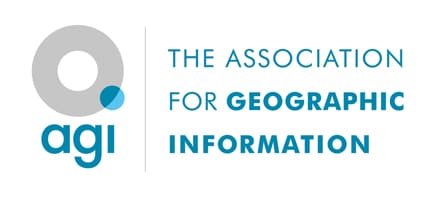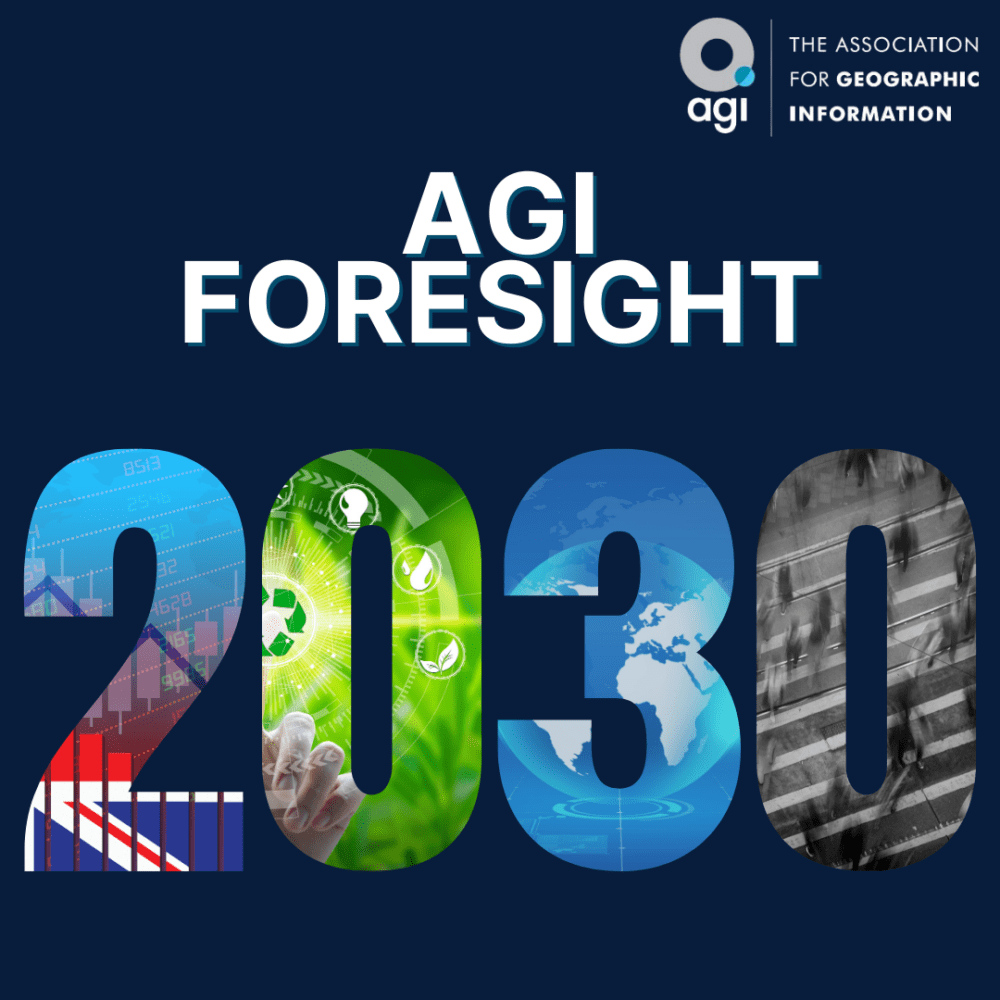GEO Business, held during the first week of June, also provided an excellent opportunity for the AGI to update and engage with members and the wider community on the AGI Foresight Project that is currently being undertaken. Richard Flemming, Peter ter Haar, Denise McKenzie and Liz Scott, took to the Impact Stage to give an overview on the project and provide a heads-up on some the early themes that have been identified.
“The AGI Foresight Project is giving the geospatial sector the opportunity to look forward to 2030, to identify the key things that are influencing us as a community, as a sector, and look at what impact these things will have on the economy, the environment, and society,” commented Richard Flemming, Director of the AGI.”
Introducing the work to date, Richard continued, “To capture this intelligence the AGI has already issued a survey, open to members and the wider sector, and is currently undertaking one-to-one interviews with thought leaders from within and beyond the geospatial community.
“The final output of this project will be a comprehensive report which will be published later in the year and launched at a flagship event at the Royal Geographical Society (with IBG) in London on the 13th November.”
Richard then identified five themes identified as common threads that are solidifying within the early stages of the reports data capture: Collaboration, Artificial Intelligence, Digital Twins, Earth Systems, and Data, and introduced a member of the panel to speak on each.
“For me collaboration is the basis of organisations like the AGI, it’s the basis of standards, of innovation. So, how do we see collaboration within geospatial over the next 5 years when the world is changing and may not be as collaborative as it once was. Collaboration, especially within geospatial, has always been this dance between openness and strategic control, between systems and innovation.
“We ask of ourselves, and others ‘how open am I going to be? How much do I want to keep for myself? At what scale I am willing to be open? So, in my opinion collaboration is going to have a strong impact and success of collaboration will depend on data and system interoperability, it will depend of ethical governance of data, and it will also depend on regional and professional alliances.”
Peter then invited Denise McKenzie, Managing Partner of the Place Trust and AGI Council Member, to talk about Artificial Intelligence. “You can’t avoid talking about AI and the concerns surrounding it so I want to explore some of the challenges and opportunities as I see them.
“How we interact with geography and location data is going to change. We are going to be able to ask questions in a different way and this will change how children learn about geography and how people do their jobs using geography. But one of the challenges is that no-one has taught AI the correct way to handle to geography, and so the to the recurring point, data is really important.
“We are the experts when it comes to creating geospatial data, and explaining and creating tools to manage that, but a quote I heard earlier ‘your data matters but the interface actually matters more’ is very true when it comes to AI. So, when it comes to AI we are going to need a really different interface to learn from and work with that data.
“There is also concern that AI might change the job market, there might be job losses, but that is not proving the trend. People are not losing their jobs because of AI, but those jobs are massively changing because of the tools that are being developed.”
Liz Scott, Geospatial Solutions Architect at Satellite Applications Catapult, and AGI Director, then took over proceedings to talk about applications, specifically Digital Twins. “A core study by the University of Bristol and Energy Systems Catapult found that Digital Twins were not one of the five critical techniques identified by the National Science and Tech Council as a top priority.
“Is this because it’s considered a mission already solved, maybe its not exciting enough? I don’t know, but I do know that this is where the geospatial industry can lead. Ten years ago, our Foresight Report identified BIM as something really important and this has evolved to become the Digital Twin but in order for that to evolve, to have working models that provide connectivity between machines and buildings, we need a federation of data exchanges. We are already seeing these – the National Data Library, the Government Digital Service, the National Infrastructure, however its not just the information security we need, we need trust and collaboration.”
Liz ended with a personal concern relating to the environmental impact of technology before handing back to Richard Flemming to talk about sustainability.
“We initially labelled this section climate change but then purposefully changed it to Earth Systems. Looking back to the last Foresight Report there are an increasing number of metrics and observations that indisputably show the world is getting hotter – so it’s something we can’t not talk about; we can’t not include.
Richard then went on to provide additional examples of the real-world impact of climate change in the UK including that there have been more wildfires by April of this year than in any previous year, and as of May, there was already a drought in Cumbria. Richard also illustrated how Earth Observation data is being used to monitor evidence of climate change and model susceptibility.
Handing back to Denise, the presentation was then opened up to the audience to provide input on themes raised and their thoughts on content for the Report before closing the presentation with a call to action to attend the Foresight Event on the 13th November in London.

